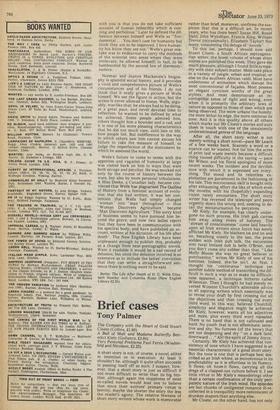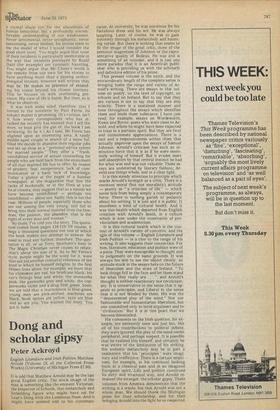Brief cases
Tony Palmer
The Company with the Heart of Gold Stuart Cloete (Collins, £1.80)
A Ball of Malt and Madame Butterfly Benedict Kiely (Gollancz, £2.60) Very Personal Problems Paul Ferris (Wiedenfeld and Nicolson, £2.25).
A short story is not, of course, a novel, either in intention or in execution. At least it shouldn't be, although it quite often succeeds in passing itself off as such. I suspect, however, that a short story is just as difficult if not more difficult to write than its big brother, although again the sloppiness of most so-called novels would lead one to believe that since their authors' primary virtue is brevity, maybe the shorter the story the less the reader's agony. The relative fewness of short story writers whose work is memorable rather than brief, moreover, confirms the suspicion that this is a difficult art. In recent years, who has there been? Susan Hill, Roald Dahl, John Wyndham, Francis King, William Trevor (occasionally), Elizabeth Taylor? Not many, considering the deluge of' novels '.
To this list, perhaps, I should now add Stuart Cloete, a South African septuagenarian writer, the latest volume of whose short stories are published this week. They gave me much pleasure, although I found little sympathy with their subject matter. Most take place in a variety of jungle, urban and tropical, or else on the southern African veldt. Most have undertones of animalism which disrupt the most conventional of facades. Most possess an elegant cynicism worthy of the great stylists. And most demonstrate an incorruptible sense of right and wrong, even when it is primarily the arbitrary laws of nature as opposed to those of men which are being observed. The more urbane the homily, the more lethal its edge, the more ominous its tone. And it is this quality above all others which marks out Mr Cloete's stories and puts them in touch with one of the consistently underestimated genres of the language.
After all, the short story writer is not merely writing a short novel—pace Mr Leach of a few weeks back. Scarcely a word or a nuance can be 'wasted. Not tor him the acres of print laid waste merely because a difficult thing caused Oifficulty in the saying — pace Mr Wilson and his florid apologists of more recent weeks. The incident and the devilish tone with which it is expressed are everything. The mood and its relentless exploitation are paramount in the fashioning of his tale. This microcosmic skill is bought only after exhausting effort the like of which even the novelist with his (hopefully) expanding vision rarely encounters. The short story writer has reversed the telescope and peers urgently down the wrong end, seeking to detail the miniaturisation he perceives.
Mr Kiely, for example, has clearly undergone no such process. His Irish gab carries him away along rivers of baloney. The 'stream of consciousness' curse laid heavily upon all Irish writers since Joyce has sorely afflicted Mr Kiely. He blathers on and on and on, breathing noisily to the last, the prose sodden with Irish pub talk, the excursions into rural Ireland sub la belle O'Brien, and you don't come any subber than that. "Like Molly Bloom she was no great believer in punctuation," writes Mr Kiely of one of his heroines. Indeed, she/he isn't. At first, I thought his ' continuous ' technique yet another subtle method of transcribing the difficult in such a way as to make its difficultness apparent, a technique hitherto called Wilsonian. Then I thought he had merely reversed Winston Churchill's admirable advice to all aspiring writers which essentially was to revise your draft by first crossing out all the objectives and then crossing out every third word. In this way, believed Churchill, simplicity and elegance might be achieved. Mr Kiely, however, wants all his adjectives and more, plus every third word repeated. There is no hand that is not calloused and hard. No youth that is not effeminate, sensitive arid shy. No furrows (of the brow) that are not deepening and dry "on a dark land, downward ..." Ali! the spirit of Jimmy Joyce.
Certainly, Mr Kiely has achieved that consistency of tone which I have suggested is an essential characteristic of a good short story. But the tone is one that is perhaps best described as an Irish whine, as monotonous in its predictability as it is effortless in its fluency. It flows, oh how % it flows, carrying all the dregs of a clapped-out culture before it. I see little virtue in Mr Kiely's meanderings other than a certain confirmation of the truly peripatetic nature of the Irish mind. His episodes are but chunks of undigested romance ill-recollected in a tranquillity more reminiscent of drunken stupors than anything else. Mr Cloete, on the other hand, has not only
a , crystal sharp eye for the absurdities of human behaviour, but a profoundly uncom
fortable understanding of our weaknesses. Never sentimental, never sycophantic, never Patronising, never modish, his stories seem to me the model of what I would consider the good short story. You might argue that none of their incidents is particularly memorable in the way that incidents portrayed by Roald Dahl (for example) are curiously haunting. You might argue that Mr Cloete's world is too remote from our own for his stories to have anything more than a passing anthro pological interest, however well written they may be. He makes no pretence of extending his vision beyond his chosen territory. This he focuses on with unrelenting precision. His view of life is harsh. But then, so is what he observes.
It was with some relief, therefore, that 1 turned to the novelette by Paul Ferris. Its subject matter is promising. (It's curious, isn't it, how every correspondent who has attacked me recently has insisted that 1 tell the story, or least give the gist of, the book I am reviewing. So be it.) As I said, Mr Ferris has alighted upon an interesting area. A randy middle-aged couple in search of a more ful filled life decide to abandon their regular jobs and set up shop as a "personal advice centre for married people." They offer a "frank, uninhibited service of sexual counselling for People who are held back from the enjoyment of all that married life has to offer, by reason of prudery, fear, inexperience, lack of communication or a basic lack of knowledge. Today a glance at the pages of a Sunday newspaper, at the magazines that line the racks of bookstalls, or at the films at your local cinema, may suggest that as a nation we have become uninhibited — perhaps too uninhibited — about sex. Sadly, this is not the case. Millions of people, especially those who are not among the very young, still fail to bring into their normal married lives the freedom, the passion, the abandon, that is the right of every man and woman." So there. I've told you the story. The quotation comes from pages 118-119. Of course, it begs a thousand questions not one of which the book makes any ,attempt to answer. No need to read any further, therefore. The quotation is all, or as Terry Southern's hero in The Magic Christian never ceases to relate, that's about the size of it. As to Mr Ferris's kstyle, purple might be the word for it, were that not,yet another colourful reference of the
kind in which he. himself delights. In the first
fifteen lines alone, for example, we learn that his chimneys are red, his briefcase black, his car's fittings blue and white, the ironworks pink, the gasworks grey and white, the copperworks violet and a drug firm green. Soon, we are told that a mantelpiece is blue-green, young men are pink-shirted, machines are black, book spines are yellow, eyes are blue and so are you. You wanted the story. You got it, babe.



































 Previous page
Previous page